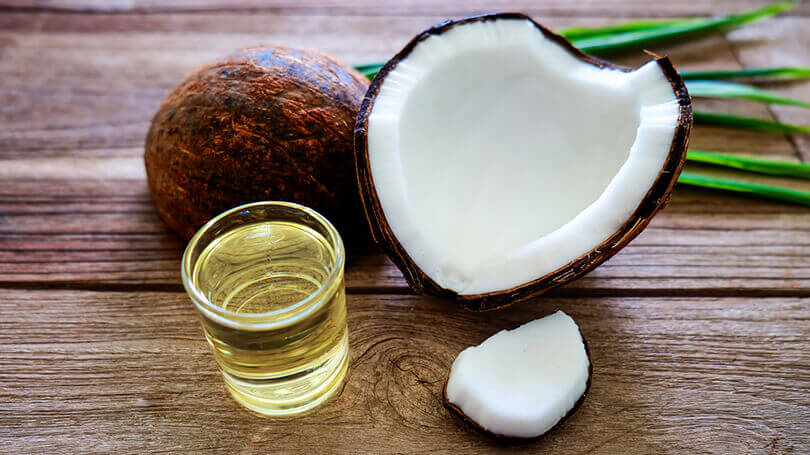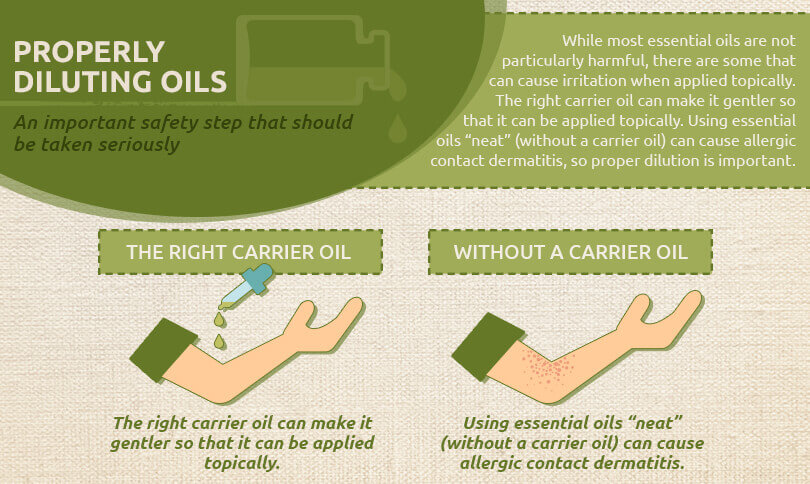 On the never-ending quest for the perfect essential oil recipes, you’ve probably come across the phrase “carrier oil” a time or two. Typically used to dilute essential oils, carrier oils are commonly employed in skincare, cleaning products, aromatherapy and diffuser recipes, and are good to have on hand if you want to apply oil to your skin directly or dial back a specific oil’s scent or intensity. All EOs should be diluted in a carrier oil before applying to the skin.
On the never-ending quest for the perfect essential oil recipes, you’ve probably come across the phrase “carrier oil” a time or two. Typically used to dilute essential oils, carrier oils are commonly employed in skincare, cleaning products, aromatherapy and diffuser recipes, and are good to have on hand if you want to apply oil to your skin directly or dial back a specific oil’s scent or intensity. All EOs should be diluted in a carrier oil before applying to the skin.
Any good essential oil evangelist should have their favorite carrier oils on hand to get the most out of a well-stocked oil collection!
If you’re new to essential oils, let us give you a quick intro! Essential oils are highly concentrated liquids derived from the leaves, flowers, roots and other parts of aromatic or healing plants.
Historians believe that essential oils have been in use for thousands of years, and that they were developed in different corners of the world independently from one another. In those many centuries, people have harnessed the power of plant-based oils for a wide range of purposes—cooking, cleaning, medicine, skincare and much, much more.

Today, such oils are becoming even more popular. You’ll find them in many natural products and you can use them to make your own natural products at home.
The highest quality natural oils tend to be the purest, which also means they’re highly concentrated. This is desirable for many reasons, but primarily it ensures you get plenty of aroma (and plant power) with every single drop. By the way, this is also why the purest and highest quality essential oils may cost a bit more, which means more bang for your buck. With that being said, Plant Therapy is committed to providing affordable essential oils so that everyone can take advantage of their benefits. Remember, with essential oils, a little bit truly goes a long way and carrier oils help them go even further.
What Are Carrier Oils?
![]() Now for the nitty-gritty.
Now for the nitty-gritty.
What do carrier oils do, exactly, and how do they differ from essential oils? Well, at their core, carrier oils are cold-pressed plant oils—especially vegetable oils that are high in fat, like coconut oil and sweet almond oil—that are used to soften or dilute essential oils, among several other jobs. Otherwise known as base oils, this kind of oil gets the “carrier” name because it’s used to carry the essential oil to the skin. but there are also many other uses for carrier oils beyond making a certain kind of oil safe for direct skin contact. Here’s some important information about carrier oil properties:
- Carrier oils (usually) aren’t scented—While some carriers, like tamanu oil and rosehip oil, do have a scent, they generally won’t drastically alter the scent of your essential oils. Think of most of these oils as neutral-smelling, so they work well in many applications.
- Carrier oils make essential oils less irritating —Safety is a prime consideration when it comes to working with essential oils. Carrier oils can improve the safety of certain recipes by making them less volatile so they reduce any risk associated with directly applying them to the skin and other surfaces.
- Carrier oils don’t evaporate—Another thing to know about essential oils is that they may evaporate and may not fully absorb into the skin. On the other hand, carrier oils are known as “fixed oils” because they stay fixed on the skin and allow for more absorption.

- Carrier oils alter consistency—No matter if you’re making an essential oil face mask or an all-natural cleaning product, consistency matters. Carrier oils basically blend with essential oils and will help you make formulas thinner or thicker, depending on the type of carrier oil.
- Carrier oils have a shelf life—Because they’re high in essential fatty acids, carrier oils do have a shelf life. Depending on the type of oil, it may last between six months and two years, so proper storage is important. Many should be stored in the refrigerator rather than at room temperature. Some carrier oils, like meadowfoam carrier oil, last much longer than others.
- Carrier oils are amazingly varied—Just like aromatic essential oils, carrier oils vary in terms of qualities, benefits and sources. They may be produced from nuts, seeds, stems or kernels. Because they differ in consistency, color, smell and benefits, there’s usually one that’s perfect for your specific applications.
A quick caveat:
![]()
Although these dilution essentials are, in theory, the same as some of the oils you’d find in your local supermarket or health foods store, it’s important that you purchase your carrier oils from a reputable essential oil provider to ensure that you’re getting the purest and highest quality carriers made specifically for mixing with essential oils.
You may also notice carrier oils are usually marked as such—you’ll often see them labeled as “coconut carrier oil” instead of just “coconut oil.” This is because carrier oils are often specifically formulated so they’re better for mixing with essential oils than their grocery store counterparts.
Why it Matters
![]()
If you’re a regular essential oil user, you already know that properly diluting oils is an important safety step, one that should be taken seriously. While most essential oils are not particularly harmful, there are some that can cause irritation when applied topically. The right carrier oil can make it gentler so that it can be applied topically. Using essential oils “neat” (without a carrier oil) can cause allergic contact dermatitis, so proper dilution is important.

Understanding how much to dilute essential oils is an important part of the process. The dilutions of certain oil formulas will dictate whether or not they’re safe for kids, the elderly, expectant mothers, and people with sensitive skin. We’d definitely recommend getting acquainted with proper dilution ratios before making your own skincare products or oil blends. Another thing to consider is that pure essential oils are an investment, and carrier oils can make your investment go further, especially if you’re creating homemade goods to market.
So, what are the best carrier oils?
![]()
With all of this in mind, what are the best carrier oils to use for your specific application? It totally depends—one carrier oil may alter the consistency or aroma of your recipe in one way, while another might alter it in another way entirely. However, there are some primary carrier oils that you should have on hand if you want to try certain recipes.
Here are the ones we recommend for every new (or seasoned) oil-lover:
- Fractionated Coconut Oil—By far our most popular carrier oil, fractionated coconut oil is a “fraction” of virgin coconut oil produced through a heating process that allows it to retain its high moisturizing ability without the extra color, odor, and temperature considerations of typical coconut oil. Regardless of how it changes in temperature, this kind of unrefined coconut oil won’t solidify. Fatty acids in coconut oil create a thicker consistency, making this carrier oil ideal for skin care, especially creams.
- Jojoba Carrier Oil—One of the best things about jojoba oil is that it’s rich in nourishing vitamin E. This makes it a popular pick for healing and soothing cosmetics, including creams, lotions, and serums for healing wounds and revitalizing the skin. In fact, jojoba oil has a consistency that closely matches the natural sebum produced in human skin, so it’s an extremely popular choice in both commercial and homemade skincare.
- Almond Carrier Oil—Aromatherapists, massage therapists, and DIY apothecaries love almond oil as a carrier because it acts as a natural emollient which helps soften the skin and soothe dry, irritated areas. However, even though nut oils generally do not trigger allergic reactions when applied topically, almond oil may not be appropriate for people who have nut allergies.
- Grapeseed Carrier Oil—The primary benefit of grapeseed oil as a carrier is that it’s one of the lightest carrier oils available, which makes it ideal for massage therapy. What’s more, the oil is non-comedogenic (meaning it won’t clog pores) which makes it a popular pick for cosmetics or any application where it might be directly applied to the skin. In general, grapeseed oil is odorless, so it’s great for many applications.
- Organic Argan Carrier Oil—You often see argan oil in all sorts of conditioners and softeners for the hair and skin. That’s not surprising since this nut carrier oil is rich in vitamin E, linoleic acid, and fatty acids, so it’s amazing for hydrating dry skin and hair. It’s great as a carrier oil because it features a typical consistency, which is easy to integrate with your essential oils, and acts as a non-greasy moisturizer in cosmetics. Because of the high content of vitamin E, argan oil is also one of the best carrier oils for softening scars.

- Avocado Carrier Oil—While grapeseed oil is one of the thinnest carrier oils, avocado oil is one of the thickest, making it appropriate for oil recipes where a thicker feel is desirable, such as in creams, serums, and lotions. Still, avocado is jam-packed with stuff that’s good for you and your skin, including vitamins A, B, D, E, and beta carotene, so it’s also great for massage oils and aromatherapy applications.
- Hempseed Carrier Oil—Made from the cannabis plant and rich with omega fatty acids and proteins, hempseed carrier oil offers a slightly nutty aroma. It’s wonderful for cosmetics and other applications where you don’t mind a slightly darker color. We recommend using our non-GMO, organic hempseed carrier oil for most applications.
- Meadowfoam Carrier Oil—Even though it’s one of the least common and most expensive carrier oils, we think that meadowfoam deserves a spot on this list because it’s one carrier oil with a long shelf life. Meadowfoam carrier oil is naturally resistant to oxidation and is one of the most stable lipids known, which helps to give it a long life.
Note that this list is by no means all-inclusive. We recommend taking a gander through our complete collection of high-quality carrier oils to learn all about the many unique options and their benefits. Other popular carrier oils include: apricot kernel, sesame, evening primrose, castor, and sunflower. Steer clear of mineral oil (baby oil), as it can clog pores, leading to blemishes, inflammation, and oily skin.
What About Carrier Oil Blends?
![]()
Naturally, there will be some instances where you want the benefits or features of multiple oils, which is where carrier oil blends come in.
These oils are formulated with two or more carrier oils to provide a myriad of unique benefits. While they can be used in your favorite oil recipes, some blends are actually great on their own and can be directly applied to the skin for beautifying and anti-aging benefits.

We offer some excellent carrier oil blends in our selection, including the popular Near Perfection Carrier Oil Blend, that contains a mixture of almond, jojoba, avocado, and tamanu oils. Together these oils create a formula that’s great for reducing the appearance of skin imperfections. Another popular blend from our store is the Younger Glo Carrier Oil Blend, which blends sunflower, sesame seed, camellia seed, rosehip, and argan oils, which can help soften fine lines and wrinkles.
Getting the Recipe Right
![]()
If you intend to use these carriers in your favorite essential oil recipes and mixes, we recommend looking at the process like you would look at baking a cake—making small adjustments to the amount and type of oils used can change the result drastically.
Whether you’re a small-batch apothecary or a savvy soap-maker, understanding the way that essential oils can be mixed and formulated will help you create products that are beautifying, therapeutic and beneficial to your physical and mental health. We want to be your go-to resource for all the purest, highest quality essential oils available. By following strict quality standards, we’re able to produce oils that are pure, natural, and great for integrating into your day-to-day routine. Happy oiling!










